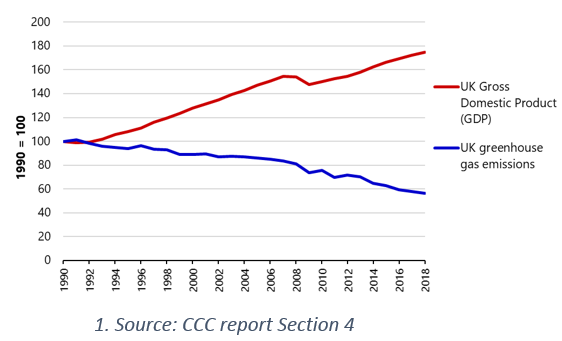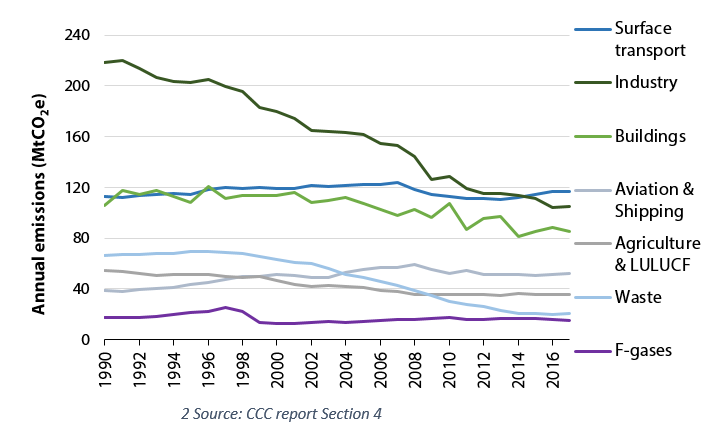
You can read the full report here, but we thought we’d give you a brief rundown of the main recommendations and where isoenergy can help you towards Net-Zero emissions.

The graph above gives us some insight into where these emissions improvements have come from. The largest reductions in emissions seem to have come from industrial processes being improved. We suspect a dwindling manufacturing base in the UK has contributed to this, but since the introduction of the Climate Change Levy and associated Agreement Schemes in the 1990s, it has been in industry’s best financial interest to reduce emissions. Improvements in domestic recycling rates, particularly of food waste, can also be clearly seen as a positive. However, one emissions stream that shows little improvement despite being the one of easiest to address is the emissions from heating our homes and businesses.
The report shows that the UK, although lagging behind some other European countries, is managing to reduce emissions whilst maintaining economic growth. This helps to illustrate that both growth and sustainability work together as some major countries still maintain the economy must come before the environment. In fact, our civilization has reached the point where growth will not be sustainable unless we take action to plan for its sustainability.
The report points out that the energy required to heat our homes and businesses accounts for around a third of our annual CO2 emissions. These emissions have been amongst the slowest to improve in the last twenty years. We believe this has been because of the subsidised fossil fuel market keeping fossil fuel prices artificially low coupled with a lack of effective renewable energy policy from Government, but it seems now the public are in the mood to make sustainable choices for themselves.
In our opinion, the low-hanging fruit for potential improvement is the wide-scale adoption of renewable heating systems. A view that the CCC also shares. Under new guidelines, heat pumps are being promoted as a solution to reducing emissions as they source two-thirds of the energy they produce from sustainable sources such as the ground, air and water, with the remaining energy coming from electricity. Electricity which can be sourced from renewables such as solar and wind offering the potential to heat your home or business with zero emissions.
Heat pumps also help address another major recommendation of the report which states domestic hot water should not be stored above 55oC. Heat pumps run at greater efficiencies when generating hot water below the report’s recommended 55oC adding to the potential improvements that can be made. You can read more about how lower hot water temperatures can make a difference in our recent blog post.
Of course, it is obvious that all properties should be as well insulated as possible. After all, the cheapest unit of heat is the one you don’t have to buy! Stopping drafts and keeping the heat in should always be the first course of action. However, in some buildings, particularly listed ones, this is not always possible. In these cases, the only sensible course of action is to install a renewable heating system. Installing a heat pump in poorly insulated property is perfectly fine as long as it is designed correctly. Our website has plenty of examples of heat pumps working well in older buildings.
The report happens to coincide with recent extended protests in central London by activist group Extinction Rebellion. Their quest to highlight the impending threat of climate change is raising the profile of sustainability to the point where even the UK Government admits more needs to be done. Also shaming politicians across Europe is sixteen-year-old Swedish schoolgirl Greta Thunberg. The young activist is hard to ignore; her solo school strikes have directly inspired similar walkouts worldwide, from the US and UK to Australia and India including around 1.4 million students. Her message that things need to change seems to be louder than the $200m spent by the oil companies lobbying Governments around the world.
The average global temperature is rising, there is huge pressure on natural habitats and biodiversity, and in order to maintain quality of life for future generations, changes must be made. The technology exists and together we can make a real, tangible difference to your carbon footprint. If you would like to find out how much your carbon footprint can be improved by installing a heat pump, get in touch or call us on 01293 821 345.